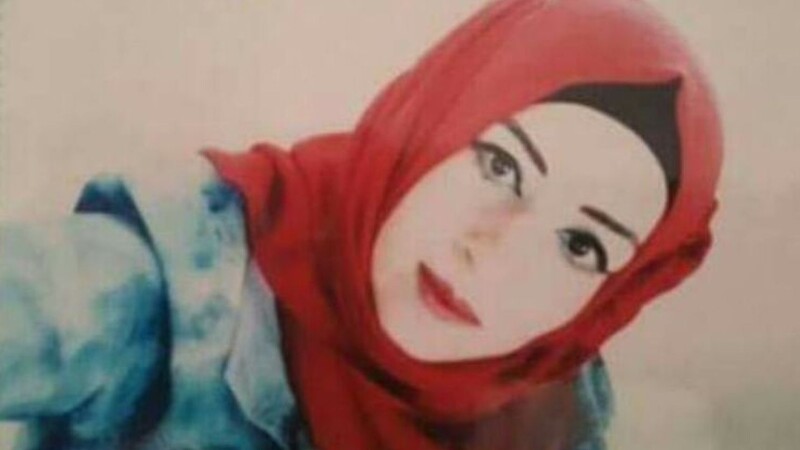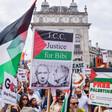Rights and Accountability 1 July 2016

Israeli forces gather at the scene of a fatal crash after an Israeli car was fired on near the West Bank city of Hebron on 1 July.
APA imagesThe Israeli military imposed closure on the occupied West Bank city of Hebron and its surroundings on Friday, affecting some 700,000 people, following a spike in deadly attacks over the past two days.
An Israeli army spokesperson told the Ma’an News Agency that movement in and out of the city and its surrounding villages would be closed indefinitely.
The closure has been described by the Tel Aviv newspaper Haaretz as the largest since a massive crackdown following the kidnapping and slaying of three Israeli youths in the West Bank in June 2014.
The closure affects only Palestinians, and not Israelis living in settlements in the area, an army spokesperson told media.
Such collective punishment measures are considered war crimes under international law.
The closure was declared after an Israeli and two Palestinians were killed in three separate incidents in the West Bank on Friday, and one day after the slaying of an Israeli girl at a settlement, after which her attacker was shot dead, and another Palestinian was killed after allegedly stabbing and injuring two Israelis in the city of Netanya.
Michael Marc, an Israeli who headed a religious school in the settlement of Otniel, was killed and his wife critically injured when their car crashed after being fired on near the occupied West Bank city of Hebron, according to the Israeli army.
Two of their children sustained moderate and light wounds, Haaretz reported.
Haaretz added that a manhunt was underway for the suspected gunman, believed to be from the West Bank village of Bani Naim, also near Hebron.
Bani Naim was subjected to closure by the Israeli military on Thursday after Muhammad Tarayra, a 19-year-old from the village, stabbed to death 13-year-old Hallel Yaffa Ariel in her bedroom in the Kiryat Arba settlement earlier in the day.
The youth was reportedly motivated by the death of his cousin Yusif Walid Tarayra, 18, who was shot dead during an alleged car ramming attack shortly after two other youths were slain during a shootout with Israeli soldiers waiting at a bus stop near the Kiryat Arba settlement in March.
A woman from Bani Naim village was shot dead one week earlier after driving into a crowd of Israelis at a bus stop outside Kiryat Arba settlement.
Three Palestinians from Bani Naim were detained during arrest raids in the predawn hours on Friday, and a fourth was arrested at a checkpoint while on his way to Jerusalem, the Ma’an News Agency reported.
Israeli Prime Minister Benjamin Netanyahu announced on Thursday that he would revoke the work permits of Tarayra’s relatives and demolish his family’s home.

Sarah Tarayra
A woman from Bani Naim, 27-year-old Sarah Tarayra, was shot dead on Friday near the Ibrahimi mosque in the Old City of Hebron, the site of several other deadly incidents since a new phrase of violence that has claimed the lives of more than 30 Israelis and 220 Palestinians, as well as two Americans, since October last year.
Israeli police claimed that the woman was killed after attempting to stab soldiers at a checkpoint. No Israelis were reported injured during the incident.
Gunshots can be heard during this video of the incident tweeted by Israel’s Channel 10:
Shortly after Sarah Tarayra was killed, a 15-year-old girl was detained at a checkpoint near the Ibrahimi mosque for allegedly possessing a knife.An Israeli spokesperson told the Ma’an News Agency that the girl was being interrogated.
Also on Friday, Muhammad Mustafa Habash, 63, was pronounced dead after he suffered excessive tear gas inhalation after Israeli forces fired on a crowd of Palestinians attempting to cross the Qalandiya checkpoint to pray at Jerusalem’s al-Aqsa mosque on the last Friday of Ramadan.
Israel has prevented Palestinian men under the age of 45 from traveling to Jerusalem to pray at al-Aqsa, and froze permits for 83,000 Palestinians to enter Jerusalem and Israel after two Palestinian gunmen killed four Israelis in Tel Aviv in early June.
Habash, from Asira al-Shamaliya village in the northern West Bank, was one of at least 40 Palestinians injured by tear gas inhalation during the incident.
Video from the scene shows mounted Israeli forces charging at Palestinians and men fleeing from tear gas as soldiers speaking Arabic threaten to use force against the crowd:
The office of Prime Minister Netanyahu, who paid his condolences to Hallel Yaffa Ariel’s family in their Kiryat Arba home on Friday, announced that it would withhold from the Palestinian Authority tax payments collected from Palestinians.Haaretz reported that “Israel will immediately deduct the amount of money paid monthly by the Palestinian Authority to terrorists and their families,” apparently referring to stipends paid to family members of Palestinians killed by Israeli occupation forces or during armed operations.
The amount deducted is likely to amount to millions of dollars per month, Haaretz added.
“Israel believes that the authority’s support of terror, both in terms of incitement and in payments to terrorists and their families, are an inducement to terror,” the prime minister’s office stated.
Despite such accusations and Israel’s measures of collective punishment, Israeli forces continue to cooperate closely with PA security forces to control the Palestinian population under occupation.
Israeli education minister Naftali Bennett told Haaretz that he intends to propose a series of measures at an emergency cabinet meeting on Saturday.
These would include arresting the mother and sister of Muhammad Tayrayra and their forced transfer to another area of the West Bank due to their praise of the attack, and cutting off Internet and cellular access in the Hebron area to prevent the spread of what Israel calls incitement.






Comments
IS THIS LIKE WORLD WAR II? (DIFFERENT SCENERY....)
Permalink Peter Loeb replied on
There seems little to add. Is this the "justice" and "peace" which
Elie Weisel who adored everything Zionist (Israeli) wished
to leave the world? Those who were not "Chosen People"
worshiping the Torah don't fare very well.
Aryans(Germans) hated Jews. Jews hate "Arabs"...
If you fail to applaud this inhumanity are you ...anti Semitic?
If you fail to protest it...?
----Peter Loeb, Boston, MA, USA
The Israeli's are more than
Permalink Youry replied on
The Israeli's are more than fed up with continuous Jihad, who can blame them?
If there is ever a proper
Permalink Mmmcounts replied on
If there is ever a proper Palestinian state, what is the long term plan for religious minorities within that state? What is the long term plan for Jews who may wish to establish residence within such a state? And how will the treatment of Jews within this hypothetical state compare to the treatment of Arab Muslims in Israel proper?
These are some things I wonder about sometimes. I also wonder if anti-Zionists ever think about them at all.
What about the Jewish "minority"???
Permalink Peter Loeb replied on
"What about the Jewish minority...??"
The plain truth is that---with US complicity demonstrated
over and over---there will never be a "Palestinian State".
The Zionists who never had a right to invade Palestine
ever would presumably be entitled to reside in Palestine
under the rights, rules and regulations of the government
in power. Whatever religious type that may be, it would not
be entitled to rule exclusively and by religious sect.
Of course, it may require those in Jewish only homjes
to leave. It may also require Jews inhabiting homes
taken over by conquest and force and terror to
leave these residences and spaces. Where they would
go might not be the concern of a Palestinian government
just as where the former Palestinian occupants forced out
or massacred would go did not concern the Zionist conquerors.
These would all be decisions of a future Palestinian government
under its laws and bureaucracy.
Of course, international law must be adhered to, not law
passed exclusively by the Zionist invaders.
A new Palestinian State would be sovereign.
But relax. This will not happen and we all know
that it will not happen.
There was a war with the Zionists (aka Israelis) and
the Palestinians lost. And there is continuing war
and continuing acts in defiance of international law
and ---once again thanks to the US---this is considered
permissable (by the US). The war continues dailey
and is being lost every day.
---Peter Loeb, Boston, MA, USA